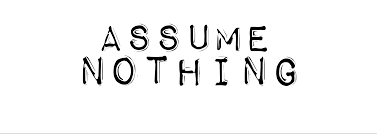I recently read the article Why is That Child So Rude by Beth Lindsey Templeton. I encourage you to read the article and share your thoughts with me either in the comments or when I see you next.
For those of you that know me personally you know exactly how this article sits with me. Who are we to assume what is going on with a child or a family? Seriously, can we make assumptions based on the limited knowledge we have in our hands?
The article points out some examples of the assumptions humans make. It also leaves our another handful of options that could be the reason why. It seems this article focuses mainly on issues of income or parent working split shifts. Although this is a significant area where funds of knowledge differ, I see gaps in only sharing one perspective. There are other funds of knowledge that the article did not address. I will try to explain a few missed opportunities for other funds of knowledge.
Children with special needs. Could it be possible that a child might show up daily with the same clothes on because they are sensitive to clothing and will only wear specific shirts or pants? Could a child that interrupts frequently have a delay in short term memory which leads to shouting out before they forget what they were going to say?
Children with mental health situations. Might a child that is sleeping in class fall asleep because they feel safe at school. Perhaps this child spends the night wide awake due to domestic abuse, addictive parents or sexual assault potential in their home. Is school the only safe place to sleep? Perhaps! Mental health can also increase the need for control. Children might be viewed as bossy when their desire for control enhances. A child might wear the same clothes or be withdrawn if they have fallen into a state of depression. If a child is depressed are they rude for sleeping or do they need support and this is their way of seeking help?
These are just two funds of knowledge that are left out of this article from my perspective. There are many others left out as well. If we, as parents and educators, continue to judge children and families without trying to walk beside them and figure out the details are we really doing what is best for children?
As adults we teach young children to be kind, compassionate, show empathy, be caring and help others out. Yet, at times, the adults are the people making assumptions about families based on the actions of children. How many times have you heard "where were the parents?" or "If that were my child." statements?
We can do better. We can change our judgements into curiosity. When we become curious we learn. When we learn we can figure out the root of the perceived rude and support the child and the family in whatever they are walking through.
The power is yours!
Run with it.



I really like the line, "We can change our judgements into curiosity". As a middle school teacher, one of my primary goals is to help students move from being so egocentric to being more altruistic. Being curious shows genuine interest and concern, whereas judgement is an egocentric act. Do you have strategies that you use to help change judgement into curiosity?
ReplyDeleteWhat a great section about students with special needs. How many times do we hear educators saying things like, "He just needs to knock that off?" or "She is looking for attention," when in reality, the student does not understand what behavior is even acceptable in the first place. As teacher burnout is rising, I worry that patience for students with special needs will lower. How might administrators build resilience and empathy amongst staffs so that they have the energy and understanding to help students with special needs?
ReplyDelete